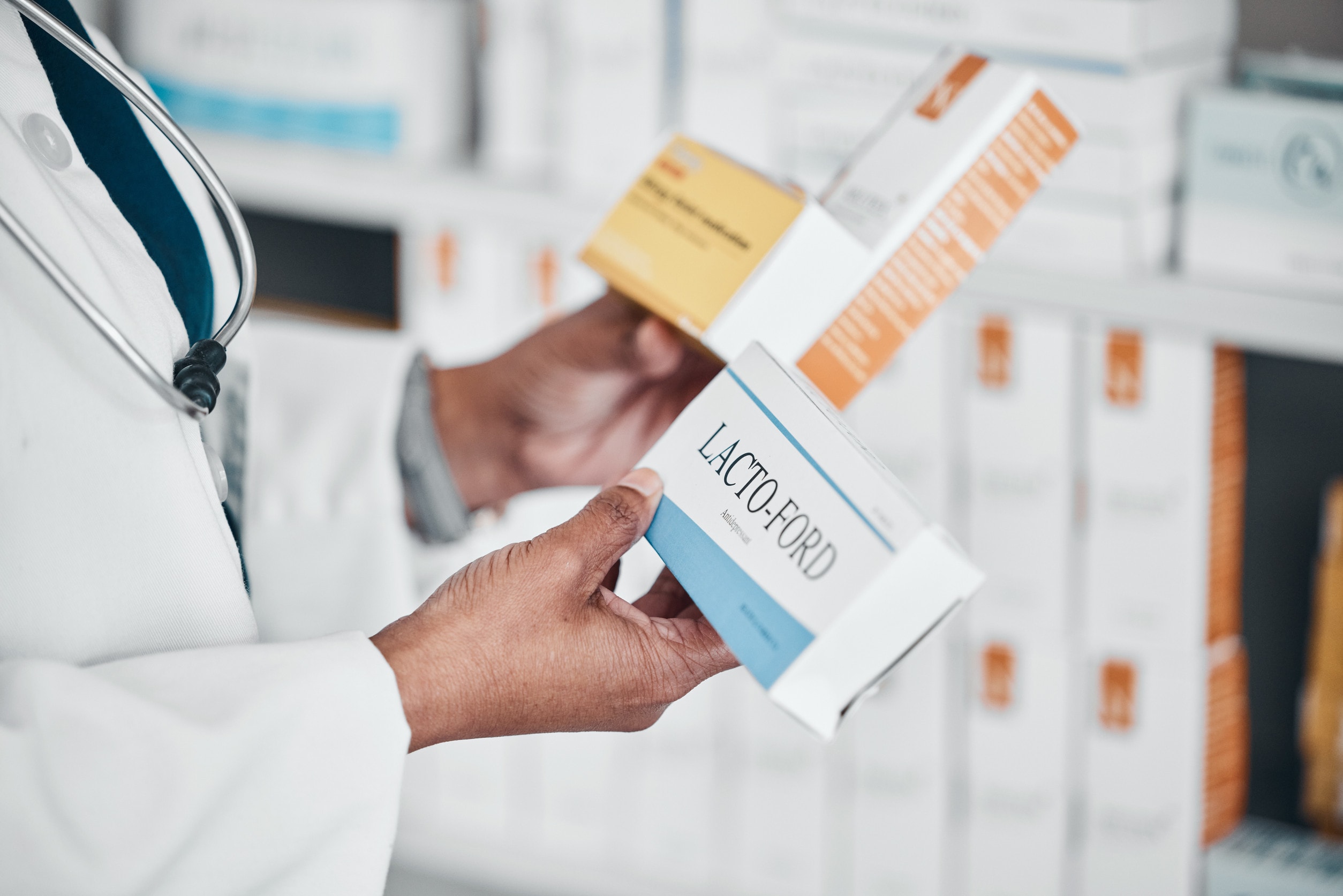According to the NHS Business Services Authority, around 1.18 billion NHS community prescriptions were dispensed in England in 2021/22. This amounts to around £10.4 billion, and this figure doesn’t even cover private prescriptions. With prescription rates rising, we expect a high standard of care from our pharmacists and technicians. But what can you do if this standard isn’t met?
In this guide, we’ll explain everything you need to know about dispensing error claims, from what they are to how they can affect you, and whether or not you could claim pharmacy negligence compensation. Keep reading to learn more, or get in touch with a member of our team today to get started on your medical negligence claim by:
- Calling us on 0800 073 8804
- Using the live chat feature
- Contacting us online
Frequently Asked Questions
- What Are Pharmacy Dispensing Error Claims?
- Am I Eligible To Make A Claim For A Medication Dispensing Error?
- Common Examples Of Negligent Dispensing Errors
- How Much Dispensing Error Compensation Can I Get?
- What Do I Need In Order To Prove Pharmacy Negligence?
- How Long Do I Have To Claim For Dispensing Errors?
- Finding A No Win No Fee Dispensing Error Claims Solicitor
- More Information
What Are Pharmacy Dispensing Error Claims?
A pharmacy dispensing error is a mistake that occurs while your prescription is being dispensed. Prescription rates are rising in England, with a jump of 3% from 2021/22 to 2022/23, and that means that the risk of a dispensing error is higher.
Dispensing errors are a type of medication mistake in healthcare. Pharmacists have a responsibility to dispense the correct medication in the correct dosage to the correct patient.
We’ll discuss some examples of common dispensing errors a little bit later in this guide. Keep reading to learn more, or contact us today to find out if you can make a medical negligence claim.
Am I Eligible To Make A Claim For A Medication Dispensing Error?
You may be wondering who can make dispensing error claims. To be eligible to make any kind of medical negligence claim, you need to be able to prove that:
- You were owed a duty of care by a medical professional
- This duty was breached
- You suffered unnecessary harm as a result
Being given the wrong medication or the wrong dosage isn’t in itself an example of negligence. This is because you need to suffer harm as a result of taking that medication.
Does My Pharmacist Owe Me A Duty Of Care?
Yes, a pharmacist is a medical professional, and all medical professionals owe their patients a duty of care. This also applies to pharmacy technicians.
To uphold their duty of care, your pharmacist needs to make sure that the care they provide meets a minimum standard. Failing to do this would be a breach of their duty. The General Pharmaceutical Council (GPC) outlines standards and guidance that pharmacists are expected to follow to ensure that the care they provide is adequate, especially when they’re dispensing medication.
Keep reading to learn more about negligent dispensing errors and how they can happen, or contact us today to get started.
Common Examples Of Negligent Dispensing Errors
Some common types of medication dispensing errors include:
- Overdosing the patient by dispensing too much medication. For example, if a pharmacist dispensed the wrong dosage of an antidepressant, giving the patient 150mg instead of 15mg, this could be fatal.
- Dispensing the wrong patient’s medication and putting it in a box labelled for someone else. For example, if you are given another patient’s penicillin and you have a known allergy to this medication, this can cause serious harm.
- Underdosing the patient by not dispensing enough. For example, if a diabetic patient thought they were injecting 10 units of insulin, but had been mistakenly given 3 units, this could cause them to get very ill.
How Can I Prevent A Medication Error?
While your pharmacist does owe you a duty of care, there are some steps that you can take to limit the risk of a medication error. For example, you can:
- Make sure you read the label and the packaging before taking your medication
- Double-check that you are taking the right dosage
- Undertake regular medication reviews with your doctor when necessary
- If something doesn’t look right, hand your prescription back to your pharmacist before taking it
These are only a few steps that you can take to limit your risk of a medication error. But if the negligent actions of a pharmacist have already harmed you, contact our team today.
How Much Dispensing Error Compensation Can I Get?
One of the most common questions we receive is, “How much compensation could I get?” And while we can’t offer any guarantees, we can help you gain a deeper understanding of what medical negligence compensation can be made up of.
First, let’s talk about general damages. This is one of two potential heads of claim, and it’s a part of every successful claimant’s payout. General damages cover the mental and physical harm you’ve suffered because of the dispensing error. It also covers loss of amenity, which measures the effect the harm has had on your ability to enjoy your hobbies.
The Judicial College Guidelines (JCG) is a helpful tool that professionals use to value compensation claims. This document provides guideline compensation brackets for different injuries and illnesses.
Below, you can see some examples of these brackets. Please keep in mind that these aren’t guaranteed, and the first entry in this table isn’t from the JCG.
| Injury | Compensation Bracket |
|---|---|
| Multiple Severe Injuries + Special Damages | Up to £1,000,000+ |
| Very Severe Brain Damage | £344,150 to £493,000 |
| Loss of Sight in One Eye with Reduced Vision in the Remaining Eye (i) | £117,150 to £219,400 |
| Established Grand Mal Epilepsy | £124,470 to £183,190 |
| Non-Traumatic Injuries To The Digestive System (i) | £46,900 to £64,070 |
| Non-Traumatic Injuries To The Digestive System (ii) | £11,640 to £23,430 |
| Non-Traumatic Injuries To The Digestive System (iii) | £4,820 to £11,640 |
| Non-Traumatic Injuries To The Digestive System (iv) | £1,110 to £4,820 |
| Total Loss of Taste and Smell | In the region of £47,810 |
| Dermatitis (a) | £16,770 to £23,430 |
What Are Special Damages?
Special damages are the second head of claim that can come together with general damages to form your payout. This heading helps you recoup the financial losses caused by the medical negligence.
For example, if you had to take time off work in order to recover, then you may have lost out on earnings. In this case, special damages could help you claim back any earnings you’ve lost and any earnings you will lose in the future.
This heading can also help you cover the cost of things like:
- Childcare
- Nursing care
- Mobility aids, like a wheelchair or crutches
- Home adjustments
- Cosmetic aids, like wigs
- Travel
- Prescriptions
- Private healthcare treatment
These are just a few examples of how special damages could help you. Contact us today to learn more about what your dispensing error compensation payout could look like.
What Do I Need In Order To Prove Pharmacy Negligence?
One of the most important steps in the dispensing error claims process is providing evidence. This is because your entire case hinges on whether or not you can prove that negligence occurred.
In medical negligence claims, the concept of causation is crucial. Causation means the link between your pharmacist breaching their duty of care and the harm you suffered. Essentially, you need to be able to prove that you wouldn’t have suffered harm if it weren’t for the dispensing error.
To do this, you can use things like:
- Photographs of visible harm, like a rash or dermatitis
- Medical records, prescriptions, and pharmacy triage notes
- Scans or test results that show internal damage
Choosing to work with a solicitor can make proving your claim feel less stressful. Our solicitors are highly trained and experienced in medical negligence claims, and they can help you pursue different avenues of compensation. Contact us today to find out more.
How Long Do I Have To Claim For Dispensing Errors?
In order to make a valid claim, you need to abide by the medical negligence claims time limit. This time limit is set out by the Limitation Act 1980, which sets out when you can start a compensation claim.
This legislation states that you can start a dispensing error compensation claim within three years of either:
- The date the negligence occurred
- The date that you connected your harm with a dispensing error, also known as the date of knowledge.
Are There Any Exceptions To This Rule?
Yes, there are some exceptions to the time limit. For example, since under-eighteens can’t claim for themselves, the time limit is suspended until their eighteenth birthday. While the time limit is suspended, a litigation friend can make their claim on their behalf. If no one else makes a claim for them, then they’ll have three years from their eighteenth birthday to claim for themselves.
Similarly, the time limit doesn’t apply to people who lack the mental capacity to claim for themselves. Instead, their claim can be made by a litigation friend.
Contact our team of advisors today to find out if you are within the time limit to make a medical negligence claim. Or, keep reading to find out how our dispensing error claims solicitors could help you.
Finding A No Win No Fee Dispensing Error Claims Solicitor
At Legal Expert, we have a proven track record of helping our clients make successful medical negligence claims. In fact, our expert medical negligence solicitors have already recovered over £80 million worth of compensation, and they can help you, too.
Our solicitors are here to help, no matter what your financial situation is. Our expert team offers its services under a Conditional Fee Agreement (CFA), which is a kind of No Win No Fee arrangement.
This kind of arrangement means you get access to all of their top-tier services, from help gathering evidence to arranging specialist rehabilitation, all without paying any upfront fees for their work.
In fact, when you work with a solicitor under a CFA, they won’t take any fees for their work upfront or as the claim continues, or at all if the claim doesn’t succeed. If it does, then they’ll take a success fee. This is taken directly from your compensation as a small percentage. However, the percentage they’re allowed to take is capped by law, ensuring that you keep the most of what you receive.
Working with a solicitor can make the claims process feel much less stressful, and our solicitors have decades of experience. Keep reading to find out how to get in touch.
Contact Legal Expert
Talk to one of our friendly advisors now to find out if one of our solicitors could help you. Start your free consultation today by:
- Calling us on 0800 073 8804
- Using the live chat feature
- Contacting us online
More Information
For more helpful clinical negligence claims guides:
- Find out the average payout for a cancer misdiagnosis
- Learn how to claim compensation for delayed treatment
- Get help with making a midwife negligence claim
Or, for further resources:
- Get help with newly prescribed medicines from the NHS
- Find out how to make a complaint to the Care Quality Commission (CQC)
- Learn about pharmacies from the NHS
Thank you for reading our guide on dispensing error claims.










